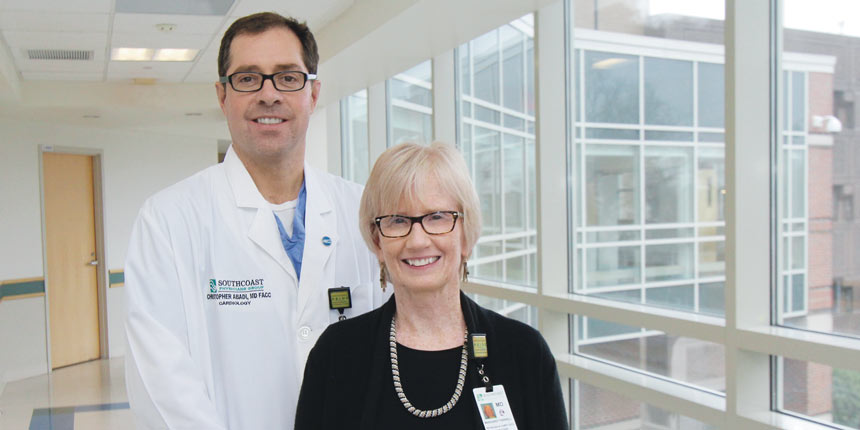Health+
Heart Care for Every Patient Need

Southcoast delivers comprehensive, advanced cardiac services
Southcoast Health was the first hospital in Southeastern Massachusetts to perform open heart surgery 15 years ago. Today, its program of cardiac and vascular care is nationally recognized for delivering exceptional clinical care and outcomes.
“We are not your typical community hospital,” says Margaret Ferrell, MD, physician-in-chief of cardiovascular services. “We are quickly becoming a destination hospital for patients seeking advanced cardiac services.”
While Southcoast still performs more than 300 open heart surgeries a year, it also offers patients a wide range of treatments — from preventive and wellness initiatives to the most sophisticated, minimally invasive surgeries available.
“What really sets us apart is that we offer comprehensive cardiovascular services,” Dr. Ferrell says, including a sophisticated arrhythmia program staffed with full-time electrophysiology physicians. “We offer a broad range of cardiovascular services to address nearly every patient need.”
Dedicated to heart care The Harold and Virginia Lash Heart and Vascular Center, which opened in 2014 at Charlton Memorial Hospital, has a hybrid operating room (OR). The hybrid OR, which looks like a futuristic operating theater, is the centerpiece of Southcoast’s structural heart program. Vascular surgery and endovascular procedures (using balloons and stents) are performed in that setting. The latest imaging equipment and other technologies allow physicians of different disciplines to collaborate on a single patient.
Downstairs from the hybrid OR, a new electrophysiology lab opened in February to accommodate advanced, minimally invasive procedures for irregular or abnormal heartbeats (see “The Latest Technology to Treat AFib”).

The breadth of treatments offered by Southcoast Health allows a team of physicians to tailor a personal plan of care for each patient. Iraklis Gerogiannis, MD, chair of cardiothoracic surgery, believes that oftentimes the best care for patients is less invasive care. “This is the future,” he says of robotic surgical techniques, which he introduced to Southcoast in 2012. Today, he performs not only cardiac artery bypass surgery, but minimally invasive valve replacement and arrhythmia procedures, in conjunction with electrophysiologists, to minimize patient risk and recovery times.
“We do these procedures in very close cooperation,” Dr. Gerogiannis says. “Here, patients go home the day after surgery because the surgical wounds are small and pain is reduced.”
Looking to the future
Southcoast has access to technology that not only is unusual for a community hospital, but in many cases is “rare in the country,” says Dr. Gerogiannis. This allows more patients to be treated close to home.
For example, for the past several years, Dr. Gerogiannis has used miniature pumps inserted through a small incision to temporarily support the functioning of the left side of the heart following serious cardiac surgery or heart attacks. This allows the diseased heart to recover more easily and gives the cardiac team time to assess the patient’s condition and prepare for additional treatment, if necessary.
Over the next few years, he expects to implant pumps that will remain permanently in the heart, as well as pumps that support the right side of the heart, which pumps blood to the lungs.
According to Dr. Gerogiannis, these new techniques and technology allow the heart team to “take care of patients who are sicker while trying to be less invasive,” which means smaller surgical incisions and faster recovery.
Innovative prevention
Dr. Gerogiannis believes that prevention is the best treatment and plans to help educate the community about lifestyle changes that can keep a heart healthy — exercise, healthy eating and not smoking. But sometimes heart trouble has nothing to do with lifestyle. It can also be a byproduct of cancer treatment.
“Survivors of early-stage breast cancer can be more likely to die of cardiovascular disease than of the cancer itself,” says cardiologist Christopher Abadi, MD, FACC, who is the medical director of Southcoast’s Echocardiography Labs.
For that reason, Dr. Abadi is heading a new Cardiac Oncology program for Southcoast. It uses a new technology called strain imaging that allows for earlier detection of a decrease in heart muscle function, which can be caused by certain chemotherapy drugs or radiation protocols. If not recognized early, it can lead to congestive heart failure.
Strain imaging equipment is now in place at Southcoast’s clinic in Middletown, R.I., Southcoast Cardiology Services at the Truesdale Health clinic in Fall River, and the Southcoast Cancer Center in Fairhaven. Cancer patients can receive cardiac assessments at any of these locations.
Dr. Christopher Abadi for Health+ May 2017v2 from Southcoast Health on Vimeo.
Committed to growth
Over time, Dr. Gerogiannis expects Southcoast may need to expand its facilities further to accommodate growing cardiac care programs.
The system has become a training center for physicians from other states, who come here to learn the leading clinical cardiac treatments and use the latest medical equipment.
“This is an outstanding, modern and comprehensive program,” Dr. Gerogiannis says. “Our great strengths are our extremely dedicated staff, our utilization of evidence-based, multidisciplinary care, our investment in cutting-edge technology and, most importantly, our commitment to our patients. Every single patient who has cardiac surgery at Southcoast Health gets our personalized attention directed toward their unique needs. Southcoast is truly defining what it means to be patient focused.”
Learn more about Southcoast’s cardiovascular services.
